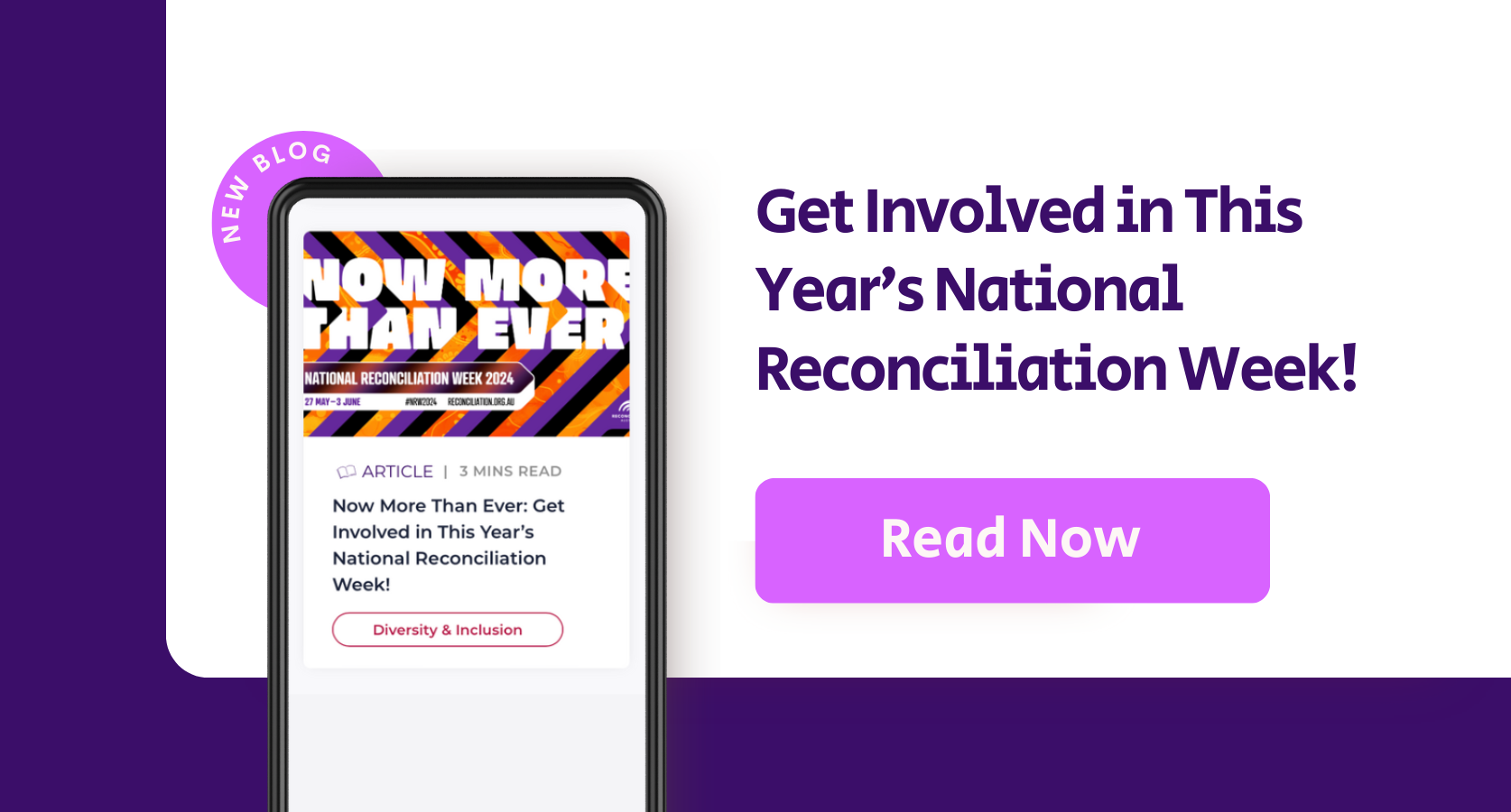This National Reconciliation Week, we want to shine a light on inclusivity in the workplace. To be frank, there’s nothing more important! We spend a lot of our life at work, and thus, our working environments need to empower everyone to be their true selves.
By discussing the importance of indigenous opportunities, supportive practices and indigenous career opportunities, we want to guide you to do your bit for inclusivity and notice when things in the workplace aren’t quite right.
The Importance of Indigenous Opportunities
Indigenous and First Nations people are making brilliant contributions to Australia’s workforce, yet they aren’t receiving equal opportunities due to additional barriers to their work and study.
Workforces that choose to employ an inclusive hiring strategy benefit from different perspectives, experience and knowledge. What’s more, a diverse workplace fosters higher levels of cultural awareness; it’s a win-win situation!
If you’re an indigenous job seeker, a great resource to check out is our First Nations-focused employer pages. Who knows, you might just find your dream job there!
How To Support Your Indigenous Coworkers
If you’re not indigenous yourself but want to get educated on how to best support your indigenous colleagues, good on you! Education is the first step towards inclusivity and understanding. To get you started, we’ve put together a list of ways that you can make sure your indigenous coworkers feel heard and supported. What’s more, these tips work outside the workplace too!
1. Educate Yourself on Indigenous Australian Culture
The most vital means of supporting your Indigenous coworkers is though self-directed education on their culture and history. For example, all Australians should be familiar with an Acknowledgement of Country, but not all of us understand why it’s so important. Shelly Reys has released an incredible TED talk on the subject, and we highly recommend tuning in; it’s incredibly important to understand why recognising the traditional custodians of the land is so vital.
2. Get Involved with Local Community Events and Reconciliation Efforts
By dedicating your time to attending designated reconciliation events, you’re not only educating yourself on prevalent Indigenous issues; you’re also showing support for your colleague’s culture. There are plenty of opportunities coming up this National Reconciliation Week, and you can find them all on Reconciliation Australia’s website.
3. Support Indigenous Artists and Businesses
Whether this means attending an Indigenous art show or shopping from local indigenous retailers, supporting Indigenous creators and sellers is a fantastic way to contribute to economic development. If you’re social media savvy, it’s great to post about Indigenous businesses too. Who knows, you might just send some more customers their way!
4. Create a Safe Space for Your Coworkers to Share Their Experiences
By demonstrating kindness, empathy and openness, you’ll foster a safe environment where open dialogues can take place about sensitive issues. You want to make sure your coworkers know that you have their backs and that they can come to you with any problems they might be having. If they do so, make sure you practice active listening and offer to help in any way you can.
Remember that this is by no means an exhaustive list; it’s just a way to get you started. Just as reconciliation must be a consistent effort, support must be too.
Inclusivity in the Workplace
Let’s be real for a second; if a workplace isn’t inclusive, it’s toxic. A positive working environment is one where all employees can be themselves by embracing their culture (and anything else that makes them unique)!
None of us want to work in un-inclusive environments, so we’ve put together a list of green flags and red flags to look out for when you’re on your next job hunt:
Green Flags
- Diverse Leadership and Representation
- Equal Career Progression Opportunities
- Diversity-Focused Recruitment Programs
- Leaders With Active Listening Skills and a Curious Mindset
- Recognition and Education of Staff on Important Indigenous Matters
- Feeling Safe to Discuss Your Culture in the Workplace
Red Flags
- Non-Inclusive Recruitment Practices
- A Lack of Inclusion and Community-Based Initiatives
- Little-To-No Employee Support
- Lack of Diverse Representation in Marketing and Branding
If you notice any of these red flags on your next job hunt, remember that it’s more than ok to ask about a company’s inclusivity policies. Hopefully, they’ll be taking steps to become more inclusive, and your contributions might help them do so.
Employers and Allyship
It’s incredibly important for companies to actively work towards inclusive work environments, and luckily, more and more are starting to. If you want to check out some of our employers with future-focused RAC plans, we’ve put together a list to help you out:
1. Coles
Coles is Australia’s largest private sector employer of Aboriginal and Torres Strait Islander people and has over 4,800 Indigenous team members. They’re also actively working to expand the number of Indigenous workers, showing their commitment to consistent, sustained change.
For more information about their program or for help with an application, they encourage you to email them today at IndigenousAffairs@coles.com.au, or you can check out their employer profile too!
2. Leidos
Leidos is on a mission to increase diversity and support inclusion in the workplace. One of the ways they’re working towards this is through their Leidos Reconciliation Action Plan (RAP). The initiative includes multiple streams, such as:
- Cultural Awareness and Training
- Diversity and Inclusion
- Indigenous Entrepreneurship and Business
Learn more about all the good done by Leidos at their employer profile.
3. Telstra
Telstra boasts a holistic view of diversity and actively prioritises opportunities for under-represented employees. They’ve partnered with CareerTrackers to create paid, multi-year internships for Indigenous students facilitated an indigenous employee representative group called Dharrang, and offers an Indigenous interview guarantee for shortlisted candidates.
Learn more about Telstra’s diversity mission by visiting their employer profile.
 4. Westpac
4. Westpac
Westpac is another company working towards a better future for all Australians with their commitment to diversity. A few of the ways they do so are by:
- Creating as many employment pathways as possible.
- Supporting the career development of Indigenous employees, interns and trainees.
- Making sure that they retain great indigenous talent through career development opportunities such as mentoring programs, short-term secondments and leadership courses.
Learn more about their future-focused initiatives by visiting their employer profile or Indigenous Careers webpage.
 5. WesTrac
5. WesTrac
Westrac’s commitment to reconciliation is at the foundation of their Reconciliation Action Plan (RAP). Through their support of community programs, such as the Carey Bindjareb and Olabud Doogethu programs, they are helping provide industry training for Aboriginal and Torres Strait Islander people engaged in the criminal justice system.
Their team also works with Nudge, an organisation that helps place young Indigenous people into jobs and traineeships and targets Indigenous Australian applicants for their apprenticeship programs.
To discover all the other aspects of Westrac’s RAP, head to their employer profile.
Final Notes
The road to reconciliation is a long one, but it’s not one that we’re going on alone. In last year’s referendum, 6.2 million Australians voted yes. If we all prioritise inclusivity, work together and actively call out exclusive workplace practices, change will happen; it has to.
To find out more about how you can get involved in reconciliation efforts, check out our blog on this year’s National Reconciliation Week or discover our First Nations focused employers today!





